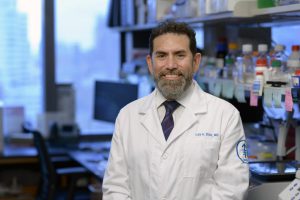DUBAI / RIYADH / GULF TIME
New results from a clinical trial led by Memorial Sloan Kettering Cancer Center (MSK), gastrointestinal oncologists Andrea Cercek, MD, and Luis Diaz Jr., MD, demonstrate how immunotherapy alone can allow people with MMRd cancers to avoid surgery and preserve their quality of life.
The results, presented at the 2025 American Association of Cancer Research (AACR) Annual Meeting and published simultaneously in The New England Journal of Medicine (NEJM), found that 80% of patients did not require surgery, radiation, or chemotherapy after six months of treatment with immunotherapy alone.
“This study shows that immunotherapy can replace surgery, radiation, and chemotherapy for mismatch repair-deficient solid tumors, which could help patients preserve their organs and avoid the harsh side effects of chemo and radiation,” said Dr. Cercek, gastrointestinal oncologist and co-director of the Center for Young Onset Colorectal and Gastrointestinal Cancer at MSK. “Preserving a patient’s quality of life while also successfully achieving positive results in eliminating their cancer is the best possible outcome. They can return to their daily routines and maintain their independence.”
This phase 2 trial is an extension of a groundbreaking study in which all rectal cancer patients treated with the immunotherapy dostarlimab experienced a complete clinical response, meaning their tumors disappeared. The U.S. Food and Drug Administration (FDA) gave dostarlimab “Breakthrough Therapy Designation” for the treatment of this type of rectal cancer in December 2024.
The updated trial included 103 patients with stage 1-3 cancer; 49 with rectal cancer; and 54 with non-rectal cancers, including gastroesophageal, hepatobiliary, colon, genitourinary, and gynecologic. For six months, they were treated with Jemperli (dostarlimab), a PD-1 inhibitor made by GSK. Checkpoint inhibitors work by helping the immune system recognize and attack cancer cells.
The results of this trial showed that 80% of patients with several types of cancer were successfully treated with only immunotherapy. The standard of care for many cancers that have this specific MMRd genetic mutation has been surgery, radiation, and chemotherapy. Still, the patients who responded positively did not require surgery to remove an organ and did not experience chemotherapy or radiation, which improved their quality of life. This trial is the first time that immunotherapy has been shown to replace surgery for a variety of solid tumors.
“The majority of patients in the trial saw their tumors completely disappear,” said Dr. Diaz, gastrointestinal oncologist and Head of the Division of Solid Tumor Oncology at MSK. “These results could change how we treat some cancers. Current treatments like surgery, radiation, and chemotherapy can seriously affect quality of life. For example, treating rectal cancer this way can lead to infertility and problems with bowel, bladder, and sexual function, as well as other daily challenges.”
Description
Patients
Complete response
Total patients in the trial
103
Patients with rectal cancer
49
100%
Patients with other cancers
54
65% (35)
Total complete responses
84
49 rectal – 35 other cancers
Complete responses who avoided surgery
82
For Drs. Cercek and Diaz, the goal is now to expand this approach to even more types of cancer.
MSK reinforced its longstanding commitment to serving patients from the Middle East earlier this year by introducing enhanced services designed to make accessing world-class care more seamless and efficient for patients from outside the United States. This includes streamlining medical record reviews to reduce processing times, eliminating unnecessary escalations in appointment scheduling to ensure quicker access to specialists, and integrating disease-specific expertise to expedite case triage. These advancements aim to simplify the process of scheduling appointments, planning treatment, and coordinating travel to New York, ensuring patients from the Middle East receive the highest standard of care with fewer barriers. Importantly, a referral is not required to schedule an appointment, further removing obstacles for those seeking timely access to care.
The study was funded by Swim Across America, Stand Up To Cancer, the National Institutes of Health, and National Cancer Institute. We also acknowledge GSK’s support for the study by providing its PD-1 inhibitor dostarlimab, and Haystack Oncology, a Quest Diagnostics company, for the use of its ctDNA test, Haystack MRD, which allowed us to reliably view the therapeutic response in real time.
Dr. Cercek has served as an advisor for Amgen, Agenus, AbbVie, Daiichi Sankyo, Janssen, Merck, GSK, Pfizer, 3T Biosciences, Summit, UroGen, and Regeneron; has received research funding from GSK and Pfizer; and has a patent pending related to this study. Dr. Diaz reports consulting services provided to Absci, Blackstone, GSK, Innovatus Capital Partners, and Neophore; stock ownership in Amgen, Delfi Diagnostics, and Neophore; a role as fiduciary officer at Epitope and Quest Diagnostics; and intellectual property related to this work.
 The Gulf Time Newspaper One of the finest business newspapers in the UAE brought to you by our professional writers and editors.
The Gulf Time Newspaper One of the finest business newspapers in the UAE brought to you by our professional writers and editors.
